|
by Ellie Stewart I've just come home from one of our last rehearsals for Heathers: The Musical, where I put on my full costume for the first time. The cast looks fantastic due to the excellent efforts of costumier Stacey O'Brien (a theatre ninja who directed our last revue and is also playing Heather Duke) and the effervescent Mel Campbell, our sensational seamstress and co-designer. Playing Martha 'Dumptruck' Dunnstock, Westerburg High's naive, overweight sweetheart, who is kitted out in the most fabulously pink outfit imaginable (Elle Woods, watch out!) is proving both a delight and a challenge. The delightful part is playing the only nice character in a play rife with assholes. The challenge is more of an internal struggle. Can I play the 'fat' character... if I'm not fat? When our director, the excellent Karen Anslow, first gave us her thoughts on how she would approach casting Heathers, she mentioned that any role could be played by anyone in our company (provided their vocal range suited the part.) Performance would prevail over appearance. For many reasons, I'm a good choice for Martha. The extreme content of Heathers is being closely watched by our production team, and looking after the company's wellbeing is as important as protecting our audience. I've never been bullied over my appearance specifically. I have a resilient personality that can resist internalising the harsh words in the script. I felt passionate about honouring and respecting the character. The directorial decision to physically pad out the person playing Martha, all things considered, is understandable. Because we are a small company, there is a limited pool of people to cast from. It's not believable to put a perfectly average-sized body on stage and call it fat. But I know that won't stop some people finding it problematic. And while portraying a person who has a high proportion of body fat is one thing, playing a caricature is unacceptable. How do I avoid this? Let's get one thing straight. There is nothing wrong with fat bodies. There is nothing wrong with any body. Body policing is never going to have a positive impact on the policed. Who can ever know why someone looks the way they do? Cries of 'but, health!' ring starkly of false concern, and factors ranging from socioeconomic status to plain old genetics are all at play in myriad ways, rendering the opinions of others irrelevant. No one has the right to tell others what to do with their body. When it comes to beauty, real world definitions are endless, and individual perceptions of perfection are unique. Dismantling the strict beauty standards that put whiteness and thinness at the forefront of social values is integral to equality and the wellbeing of young people. Let's stop punishing ourselves for not fitting into the narrowest of categories. I can say all this, and I can believe all this. I can acknowledge the hell out of the privilege I'm afforded as a fashionably proportioned (thanks, Kim K and Beyoncé!), white, cisgendered, straight person. But like most people with first world problems, I am still led to wonder, 'am I fat?' More specifically, 'if I were thinner, or smaller, or had a more delicate bone structure... would I be more loved?' My family and friends would probably be surprised to know that checking mirrors to make sure I'm not fat is a daily ritual. This self-policing can happily coincide with genuine confidence, self-acceptance and body positivity. These are not mutually exclusive feelings. But I don't want to waste time thinking about it. 'Beauty comes from within' is a resonant cliché. And I care less and less thanks to a healthy consumption of feminist think-pieces, being outwardly proud and confident my appearance, accepting and internalising compliments, remembering that 10 years and 10 kilos ago I had exactly the same perception of my body, and tentatively observing the slowly but surely changing global media. I want to see more diversity on stage and screen – that goes for race, ability, sexuality and gender as well as size and shape. I know people need to see themselves represented. The social impact of what we watch cannot be underestimated. Every time I see a person on film who has a physical feature I share, especially if It's not considered ideal, I am elated. Seeing yourself represented is incredibly validating. We only value what we see the most of - let's see more of what people look like. When I saw the Ghostbusters reboot, I wasn't just delighted by the great jokes and funtimes. Watching four women be at the centre of a film, and smash the Bechdel test, and do fight scenes without showing their boobs and butts, was a revelation. I finally understand why people like action films – seeing yourself in a character that kicks butt is an awe-inducing treat. The significance of Melissa McCarthy's unwavering presence on the big screen as a woman of size is profound. And getting to watch women play characters who aren't primarily there for their beauty is such a rare delight. Despite knowing on an intellectual level that this kind of representation was important, and being a person who thinks every day about the way media reflect and affect the world, I still didn't quite understand how much I needed to see it. Then I saw it two more times. But back to Heathers. Heathers centres around the worst kind of high school environment - if an overblown one, rife with extreme bullying, homophobia, fat-phobia and mental health stigma. Martha's victimisation is the same as anyone else's – supported only by the idea of 'otherness'. 'Nerds' 'cripples' and 'homos' are also maligned. This is the 80s remember, but bullying is just as prevalent in 2016, concentrated by social media and the anonymity of the internet. Let's face it – unless you are a thin, white, cisgender, straight man, being othered is a social staple. Smashing the patriarchy and pushing for social justice are battles we all need to be part of. At the end of the day, the message of Heathers is clear – no one deserves to be bullied. The othering of people is a vicious, pointless practice, whether it's brash high school bullying, or subtle digs made in public discourse. This is the message of Heathers. The butt of the joke isn't Martha's body. It's the idea of othering itself.
So what does me playing Martha mean? Well, I hope that those who care can forgive me for pretending to be something I'm not. I know it's not the same as putting on a wig, or heels, or a sparkly jumpsuit. This character has to be believed – but I want her, and people who look like her, to be respected. I hope I do Martha justice. I hope by acknowledging this burden, I can take some of the weight off.
0 Comments
By Mike Bryant
Out of the shows I've been asked to review for this musical season, Sister Act is probably the one I had the least formed opinion about. I've listened to the Original London Cast Recording many times and, although there were a couple of songs that I adored, by the time the recording finished, I was left more bamboozled than satisfied. This only goes to show that though there are some shows that are just as enjoyable to sit down and listen to, there are other shows that need the full spectacle to be fully appreciated. Sister Act definitely falls into the second category for me. For those of you who haven't seen the film (that idea makes me sad. I actually had to explain to a friend who Whoopi Goldberg was today. There are people in the world who don't know who Whoopi Goldberg is! But I digress...) Sister Act is about a lounge singer named Deloris Van Cartier who witnesses a mob murder and gets hidden away in a convent so the evil gangsters can't find her. What ensues are many classic fish-out-of-water shenanigans set to a disco-inspired beat. What I got from Wellington Musical Theatre's production of Sister Act was exactly what I expected. Fun, light, fluffy entertainment. The amount of effort that the cast and crew put in was obvious and exactly right. The choreography by Stacey Neale was fantastic and seemed to fit each individual cast member's abilities to a tee and, even though I am very much not a dancer (see every Footlights show I've been in, ever), the choreography had that rare quality of making me want to get up, don one of those faaaabulous nun outfits and join in - it looked like that much fun! Wellington Musical Theatre obviously has a larger budget than most amateur theatre companies and that showed in the sets and costumes, both of which set the time and place accordingly. Particularly the costumes. I want the costumes. All of them. I don't care if they don't fit me, I want them. Leading the cast was Deloris, played by Lahleina Feaunati. Feaunati sang the role with such conviction that made the character's singing career seem like a legitimate thing. She nailed every single note and I was absolutely blown away; my only major note on Feaunati was that although she nailed the sassy, smart-mouthed aspects of the character, it started to feel a bit one-note after a while. I would have preferred to see a bit more nuance in the character with less of a focus on the sass and more on how big Deloris' heart is, especially since I feel that Feaunati could have pulled the softer parts of Deloris off really satisfactorily. Other cast members I liked were Footlights alumni Tania Parker-Dreaver as Sister Mary Patrick and Joe Mara as Sweaty Eddie. Parker-Dreaver played the adorably optimistic and perpetually cheerful nun with great aplomb (but to be fair, how much of that was acting and how much of that was just how she is in real life is up for debate) and Mara's voice soared majestically and turned a forgettable song into one of the many highlights of the show. Jess Old portrayed the sweetly shy Sister Mary Robert absolutely beautifully, fully inhabiting this character so completely that you just want to take her home and look after her. (In a parental way. Not in a creepy way.) Jonathan Morgan, Ben Emerson and WIlliam Dean (the latter two both being Footlightians... Footlighters? Footlettes?) threatened to steal the show at certain points, particularly Morgan, who I found endearingly naive and utterly hilarious. But, by far, my favourite person onstage was Stephanie Gartrell who infused the character of Mother Superior with all of the gravitas needed. Any time Gartrell made an appearance, I couldn't stop grinning. She had the exact amount of dry humour and personality required to bring such a straight-laced lady to life and her voice on "Here Within These Walls" gave me goosebumps. Overall, this show was such a fun time. I laughed a lot and it was a perfect way to escape a miserable, rainy day. Good job to the cast and crew. Sister Act runs until September 24th at the Opera House. TIckets are available at http://premier.ticketek.co.nz/shows/show.aspx?sh=SISTERAC16 Murder, bullying, drugs, teenage sex and suicide are not typically covered in musical theatre but, as Wellington audiences will discover next week, Heathers is hardly a typical musical. Heathers: The Musical is based on the cult classic 1989 film starring Winona Ryder and Christian Slater and, like the film, it includes dark topics including bullying, depression, suicide, drug use, and sexual violence. While the musical is presented as a dark comedy, the confronting themes may be challenging for some. Wellington Footlights is proud to be partnering with Youthline to help support audience members and spark healthy discussion. “We have a responsibility to look after our audience’s well-being. While we think the musical appropriately tackles these important issues, we also appreciate that audience members may struggle with the themes explored,” says Heathers director Karen Anslow. “The homophobia, the bullying, the language in Heathers is a product of its time, but these themes are still relevant to young people even 30 years later, with online bullying a prevalent and growing problem. While we think the musical approaches these themes respectfully, it is difficult to know what may trigger strong emotional reactions, which is why we will be at the performances supporting people,” says Chloe Bisley-Wright, Youthline Wellington’s Education & Youth Development Coordinator. Youthline staff members will be in the foyer during intermission of all four performances and written resources will also be available. Heathers: The Musical was first performed off Broadway in 2014 but it is set in 1989. The musical, which begins next week, is a New Zealand Premiere. About Heathers: The Musical 27-30 September Presented by the Wellington Footlights Society Whitireia Theatre Bookings: http://thetheatre.co.nz/bookings/ $28 adult / $20 concession Contact:
Not so long ago, it came to our attention that not one, not two, but five major musicals were being staged around central Wellington. This is pretty rare; mostly, we aren’t this in sync but, for whatever reason, this year we all wanted to put on musical shows at the same time. After some discussion, the Footlights decided that it was far better to partner with our friends and support their work than try to compete against them. After all, we are all dedicated to musical theatre. So we sat down with our friends at Stagecraft, Backyard Theatre, Wellington Musical Theatre and Whitireia Performing Arts School and create a collaboration. This collaboration is mostly around publicity of all the shows, but we also share things like props, as well as talent. Footlights brought several big offers with us: publicity (like writing media releases), project management and... our own resident musical snob, Mike Bryant. We’ve arranged for Mike to see as many shows as he can and write his own review. His first review was a bit of challenge for him: Urinetown by Stagecraft. Without further ado, here’s Mike to tell you all about the show...
A Review of Urinetown by Mike Bryant I'm not going to beat around the bush; when it comes to Urinetown (the show itself, not this individual production) I am not a fan. Now, don't get me wrong, I like toilet humour (tee-hee. Toilet) as much as the next fellow, maybe more, but I just never managed to wrap my head around this show. However, that didn't stop me from having a bladder-bursting good time at the Stagecraft production currently playing at the Gryphon Theatre. That sentence was very nearly literal. If you go to see Urinetown, don't make my mistake and over indulge on the water beforehand. There is a lot of talk about urination and towards the end of the first act... well... let me just say that it was not a comfortable experience, dear reader. The first thing I noticed when I walked into the theatre was the set. And what a set it is. Illuminated to gloomy perfection by lighting designer David Heaphy, Anna Rowe's set design is striking and effective. When I read in other reviews that the set was the reviewer's favourite part of a show, I assume it's a cheap pot-shot at the other aspects of said production, but the set really WAS my favourite part of Urinetown, and seeing as everything else was pretty solid, that's no small feat. I don't want to describe the set for you, because I don't want to take that experience away from potential audience members, but suffice to say that I've worked in the Gryphon Theatre many times over the years and I have never seen it look anything like this. The show starts with Officer Lockstock (Daniel Pooley) and Little Sally (Gemma Revell) lamenting the fact that a bad title and "too much exposition" can very quickly kill a show. Pooley is one of my favourite people to watch onstage, due to his wild-eyed mania which never fails to draw my eye, so it was a pleasant surprise to find an actor who can match him as exquisitely as Revell, and the recurring moments between these two characters became my favourite parts of the show. (Side note. I've never met her at all, but can someone please cast Revell as Little Red Riding Hood in Into the Woods? If she hasn't done it already.) In fact, the entire cast throw themselves into their roles with a huge amount of gusto, whether a lead or part of the ensemble. Of particular note for me were Wellington theatre icon Jane Keller as Miss Pennywise, who takes the lead in my favourite song "A Privilege to Pee" and Footlights whanau member Kenneth Gaffney, who shines in the seemingly written-for-him role of Bobby Strong, filling the hero with a winning combination of sweetness and steel bravery. And, of course, Ange Bickford whom I couldn't take my eyes off (which also applies to how I feel about her in real life because, damn, that woman is beautiful, crazy talented and constantly making me question my sexuality.) Bickford plays the role of Josephine Strong who, in the hands of someone less skilled, could be the sort of character that could easily fade into the background, but Bickford makes every single moment count and turned Mrs. Strong into my favourite character of the piece. But, as far as I'm concerned, the show well and truly belongs to Kira Josephson who plays the faxing (and copying) lead female Hope. I honestly cannot remember the last time I was so charmed in a theatre production. Josephson managed to emphasise the realistic qualities of a very cartoon-y character and, although I'm always the sort of audience member that roots for the villains, I was geuninely hoping all of her dreams would come true at the end. And her voice! That voice! Hearing her and Gaffney sing "Follow Your Heart" was a revelation in everything a romantic comedy duet should be. My only major quibbles with this production are probably verging on the pedantic. The lighting, which started the show off with just the right mood, became a trifle dark for my taste, to the point where I struggled to make out the expressions on a lot of the character's faces. I also feel like the show would have benefited from clearer diction. At points I had a struggle catching lyrics and dialogue from the chorus. Overall, this is an extremely solid production and a thoroughly enjoyable night out with some of the most talented performers in the Wellington musical theatre scene. I definitely recommend getting along to see it. Urinetown runs until September 24th at the Gryphon Theatre. TIckets are available at https://www.iticket.co.nz/events/2016/sep/urinetown-the-musical |
About |
Shows |
Contact
|

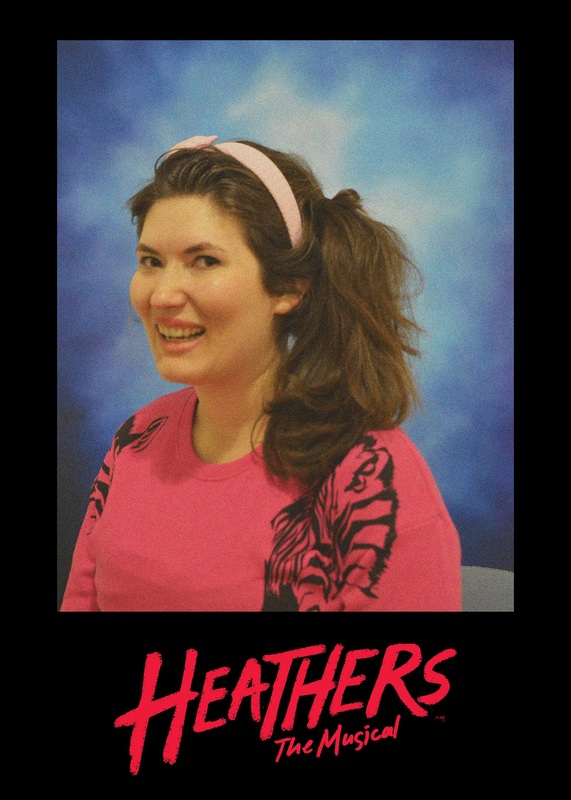
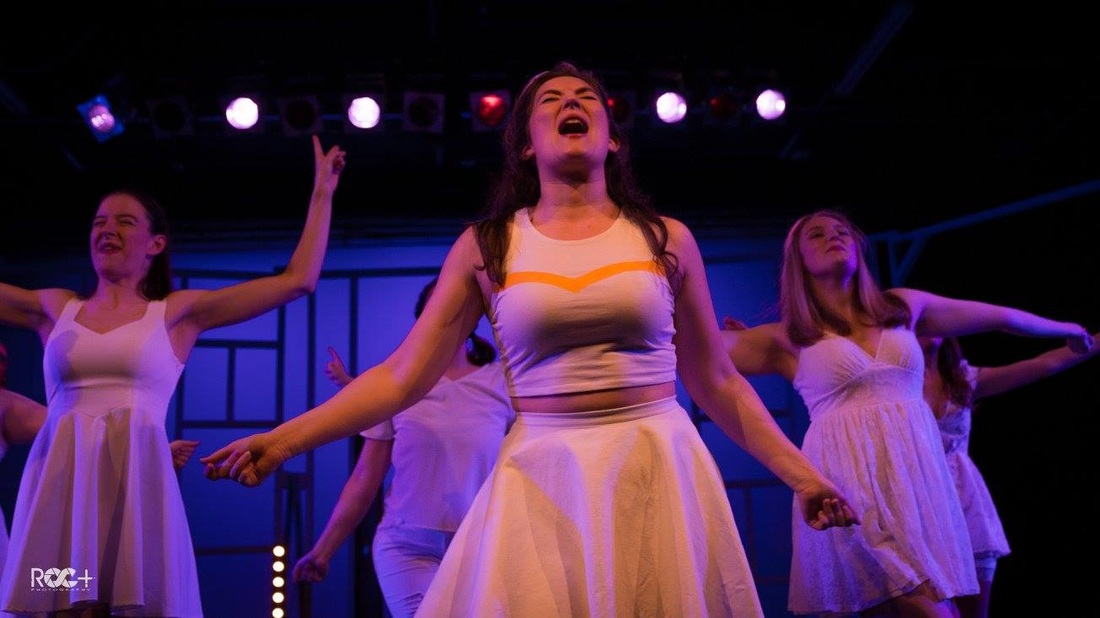
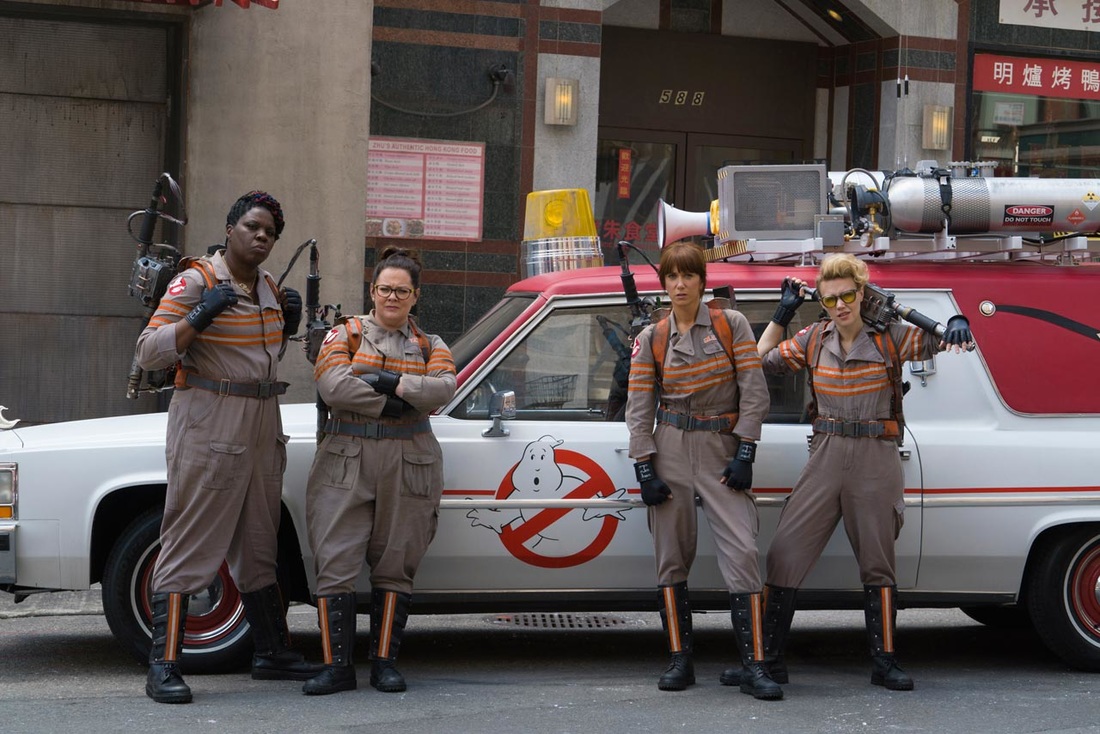
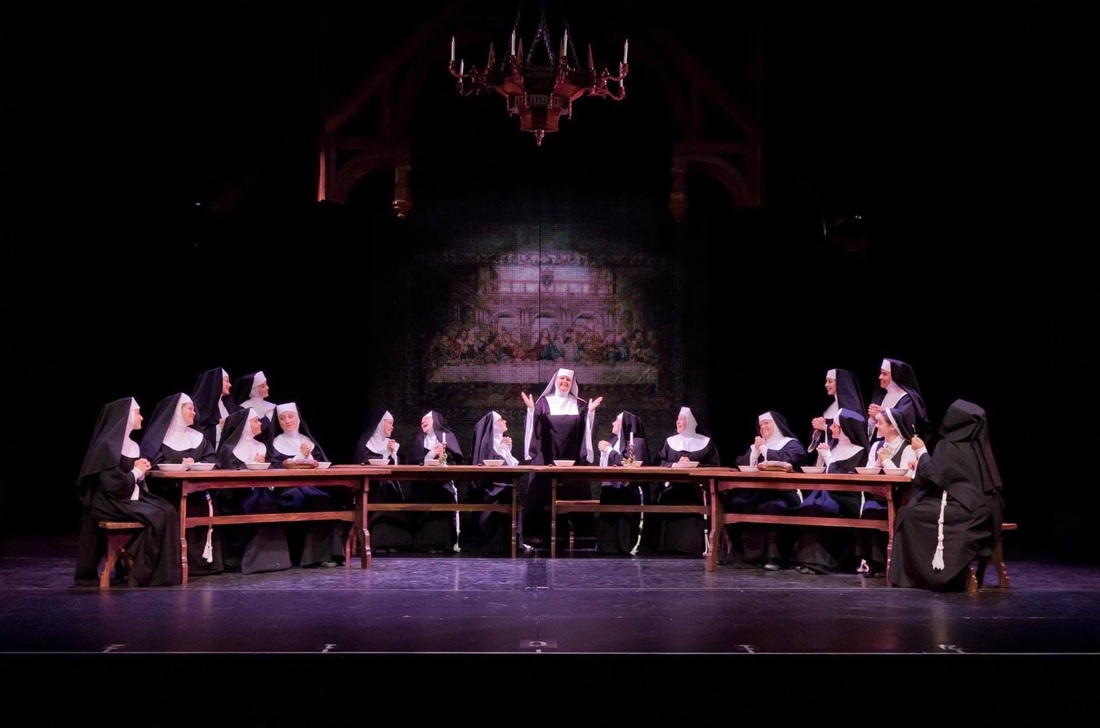
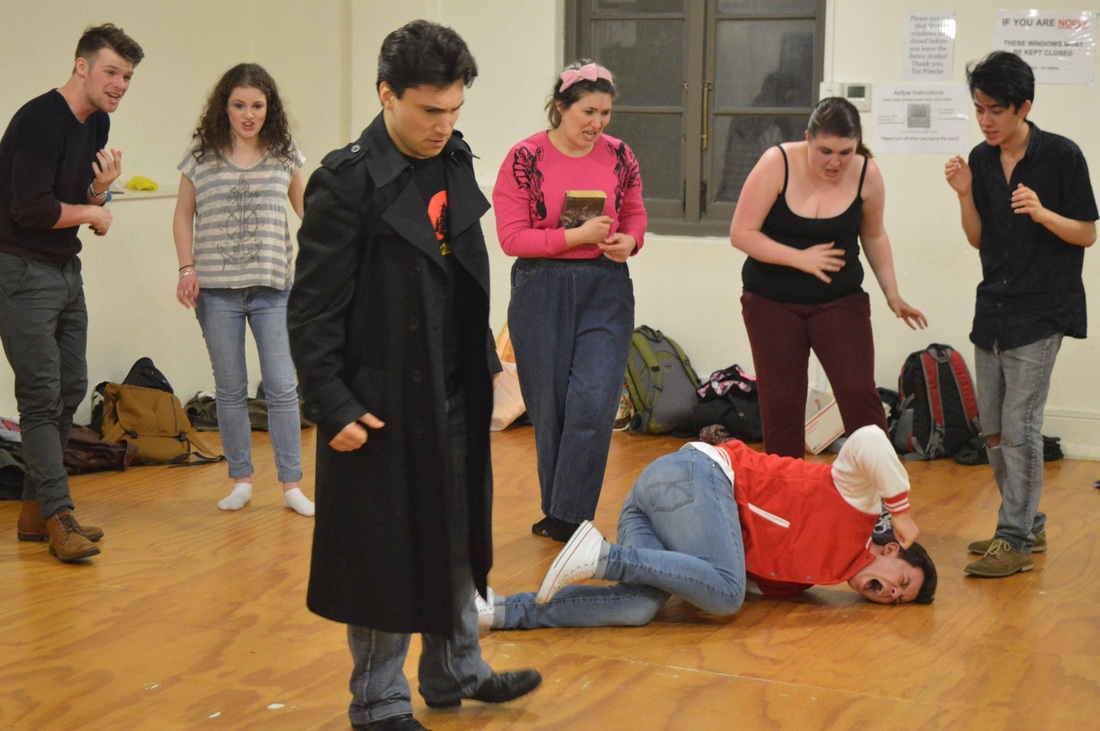
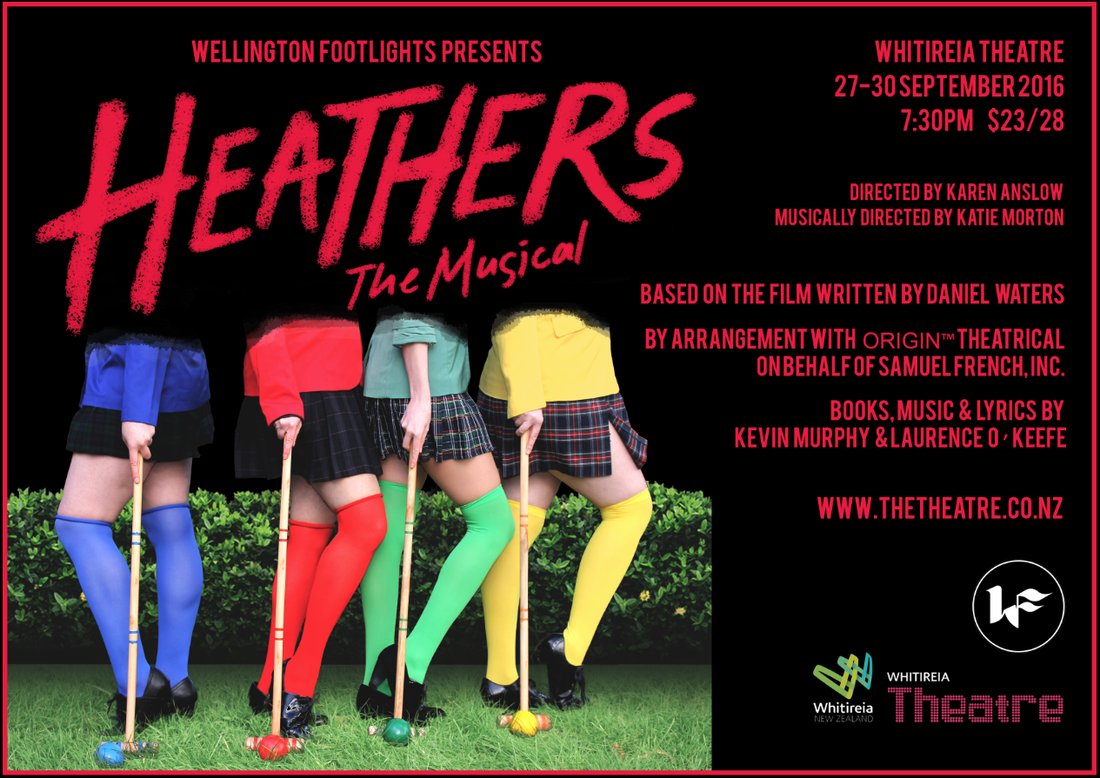
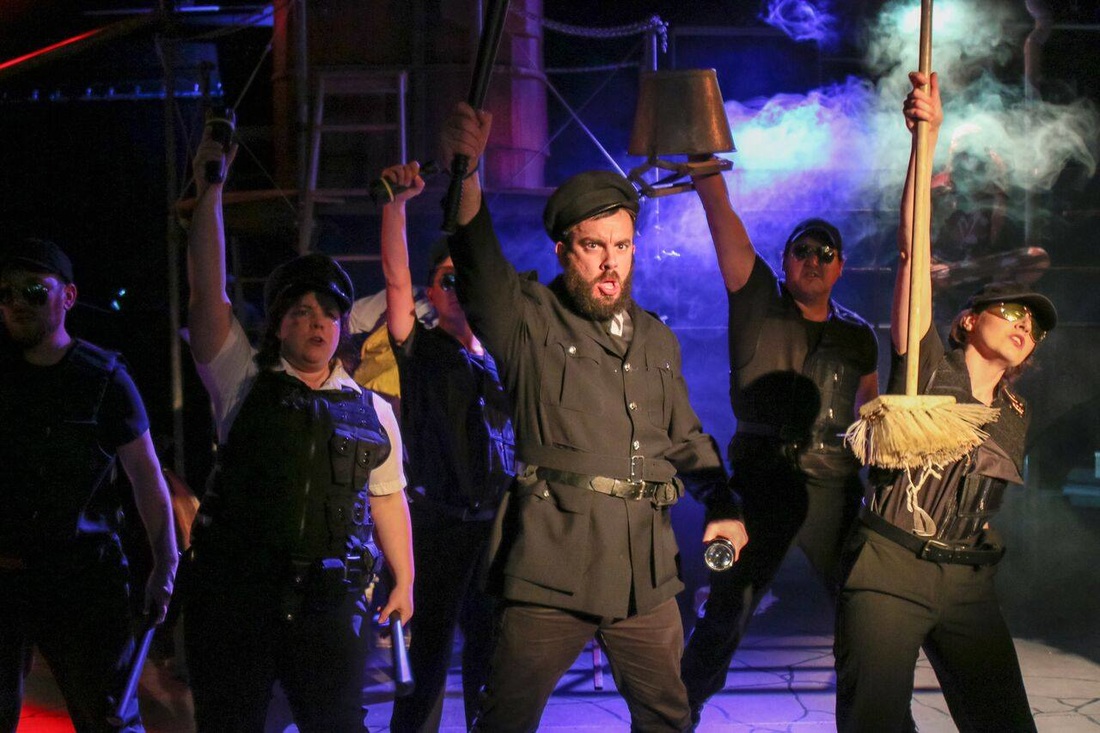
 RSS Feed
RSS Feed